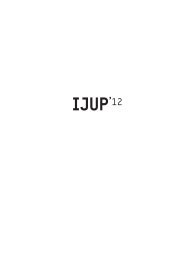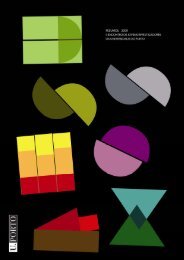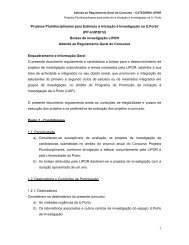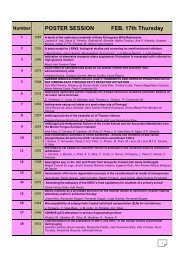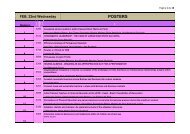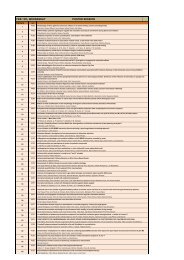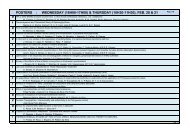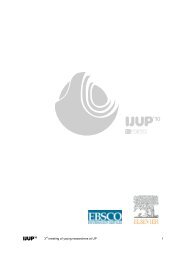IJUP08 - Universidade do Porto
IJUP08 - Universidade do Porto
IJUP08 - Universidade do Porto
- TAGS
- universidade
- porto
- ijup.up.pt
Create successful ePaper yourself
Turn your PDF publications into a flip-book with our unique Google optimized e-Paper software.
Processes of corruption in Portugal: results of an exploratory<br />
research<br />
R. Faria 1 , C. da Agra 2<br />
1 School of Criminology, Faculty of Law, University of <strong>Porto</strong>, Portugal.<br />
2 School of Criminology, Faculty of Law, University of <strong>Porto</strong>, Portugal.<br />
Portugal lacks empirical research on corruption through a criminological approach [1]. The<br />
School of Criminology of <strong>Porto</strong> is trying to fill this empirical and theoretical gap by<br />
analysing literature proceeding from other social sciences (v.g. Law), collecting data and<br />
sketching the features of the usual actors and stages involved in this deviant behaviour, in<br />
our country.<br />
This exploratory research aims to enlighten the following items: (1) standings about the<br />
law, (2) black figures, (3) reasons and features of the complaints presented to the police;<br />
(4) the transition from the police system to the judicial; (4) dynamics of the trial; (5) type,<br />
incidence and features of the penal sanctions; (6) areas considered to be permeable to<br />
corruption; and (7) main causes for corruption practices. These items (except 6 and 7)<br />
follow the usual treatment given by the formal instances of control to the crime of<br />
corruption.<br />
For this purpose, we have endeavoured a <strong>do</strong>cumental analysis (Crime Statistics, reports<br />
from Transparency International, European Group of States against Corruption, and<br />
International Crime Victimization Survey) and conducted 5 semi-directive interviews with<br />
privileged informers.<br />
We were able to somehow understand the standings of the interviewees about the present<br />
laws of fight against corruption, as well as some interesting features on the complaints<br />
presented to the police, the handling of crimes of corruption by the judicial system and<br />
some of the main purposes of those who enact in these deviant behaviours. Besides, some<br />
results allow us to understand the crime of corruption as being a typical white-collar crime<br />
[2] or economic crime [3], eventually driven by rational choice [4-5].<br />
References:<br />
[1] Faria, R. (2007), Corrupção: descrições e reflexões. Sobre a possibilidade de realização de<br />
uma abordagem criminológica ao fenómeno da corrupção em Portugal, Revista Portuguesa de<br />
Ciência Criminal, 17 (1), 107-146.<br />
[2] Nelken, D. (2002), White-Collar Crime, in Maguire, Morgan and Reiner (Eds.), The Oxford<br />
Handbook of Criminology (3ª ed.), Oxford, Oxford University Press, pp. 844-877<br />
[3] Ponsaers, P., and Ruggiero, V. (Eds.), (2002), La criminalité économique et financière en<br />
Europe, Paris, l'Harmattan.<br />
[4] Cusson, M. (2006), Criminologia, Cruz Quebrada, Casa das Letras.<br />
[5] Queloz, N., Borghi, M. and Cesoni, M.L., (2000), Processus de corruption en Suisse, Genève,<br />
Helbing & Lichtenhahn<br />
93



